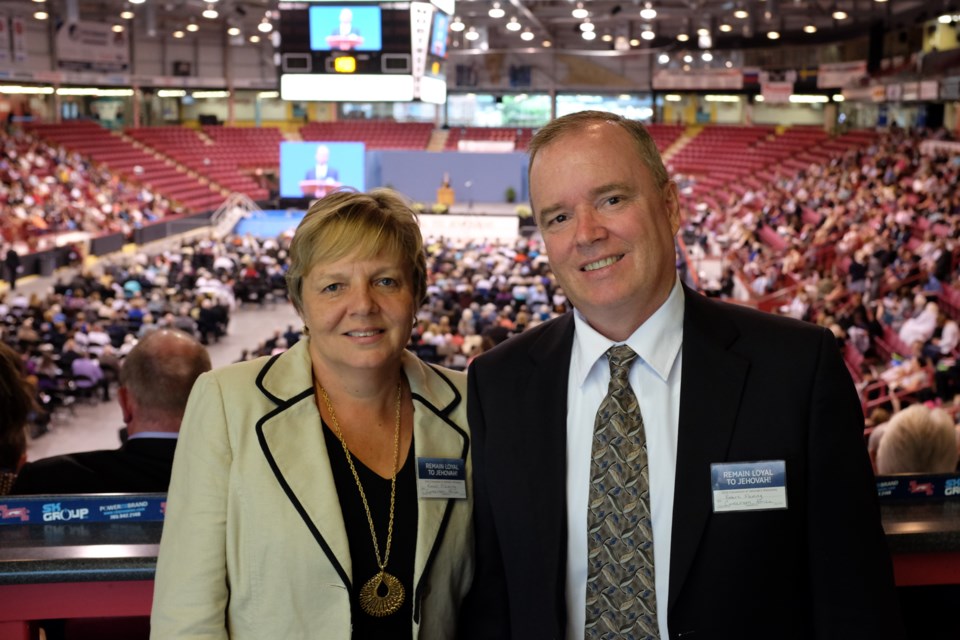Robert Fleming travels the deserts, jungles, savannahs, and waters of West Africa hoping people will see what he sees in the Bible.
Fleming is a Sault born-and-raised fourth generation Jehovah’s Witness who left the area when he was 24 and came back for the first time in 20 years last week to visit family and attend a regional annual conference of Jehovah’s Witnesses.
In an interview with SooToday Fleming talked a bit about his family’s history and about his life preaching in West Africa.
Fleming’s great grandfather John Fleming came from Scotland to the Sault in the early 1900s and when the Spanish flu hit the area he got a job at the cemetery on Fourth Line.
One day he was literally standing body-deep in a grave he’d just dug out when a Jehovah’s Witness approached him and commented, “you know, that’s hell you’re standing in."
John Fleming was puzzled and, after through conversation learned about how Jehovah’s Witnesses don’t believe in an afterlife in the same way other Christians might imagine it and other interpretations the group has of the Bible.
This meeting led to a full-blown conversion and three generations later John Fleming’s descendants are still practicing Jehovah’s Witnesses.
“My earliest memories are me going door to door as a kingdom preacher,” said Robert Fleming who after his father, grandfather, and great grandfather is continuing the tradition.
“Third Line, Carpin Beach Road, Leighs Bay Road. I don’t know if the old-timers are still there or if I’d even remember them. I was very young,” said Robert Fleming.
Fleming left the Sault in 1985 to preach in Quebec and in 1995 he went to the Jehovah’s Witnesses Missionary School in Paterson, NY.
After five months of training there Fleming flew to West Africa where for the last 20 years he’s been preaching for Jehovah out of Douala, Cameroon, which at 3 million people is the country’s largest city.
“I was nervous to go, boy oh boy. I was there one week and I was checking out the price of airplane tickets to go back. Is that too honest?”
Fleming said that Cameroon is not only immensely diverse geographically — it's often called “Africa in miniature” — but also culturally as the country has roughly 200 tribes and dialects and a range of religions that include indigenous beliefs and assorted versions of Christianity and Islam.
“There’s a hundred times more religions than Canada. Every neighbourhood has its own church because they want to worship God how they think God should be worshipped,” he said.
Fleming said Cameroonians are incredibly religious people and that the Christians among them will often carry a Bible around on their phones and regularly consult it.
Fleming said the more traditional African religions that he’s encountered don’t talk about “God” or “gods” so much as they talk about “forces of nature” but that these forces seem to be roughly equivalent to the idea of “gods”.
Most Africans, regardless of their professed religion he said, continue to follow a tradition of ancestry worship, where they believe that their dead relatives are still influencing the world and helping or harming their living descendants based on how pleased they feel.
“They’ll put out salt or palm oil, things like that, to appease, say, their dead grandfather and if something bad happens in the family they might say it’s their grandfather that has done it to them. The Bamelike Tribe in the west of Cameroon, after the grandfather has been dead for a year, will actually dig up the skull and they’ll have a small alter in the home and when they have to make big decisions they’ll consulate with him.”
In his time there, Fleming has travelled by canoe and bush-bike to get to remote tribes in the jungle, like a tribe of pygmies living in grass huts, or to secluded islands off the coast of the continent, but he never goes more than a days journey.
Fleming said Jehovah’s Witnesses have been in Cameroon since the late 1930s and even though they were banned from 1970 until 1993, largely for not participating in local government because it is against their faith, even tribes like the pygmies are quite familiar with his group when they arrive.
As a preacher, Fleming said he follows the standard Jehovah’s witness preaching technique of basically asking people what they think about a topic, then introducing what the Bible teaches about that topic, and then hopefully getting a person out to a bible study group where they can learn more and potentially feel compelled to join the faith.
But unlike other Christian religions, he said, to be a Jehovah’s Witness a person cannot partially follow their old faith, and in the case of Cameroon, that means locals have to leave their ancestry worship behind — something which can be difficult for many when, like Christmas here, it's not just a religious practice but also a social one.
“When we do preach to them and they read the Bible and realize ‘Hey my grandfather is just sleeping’ that means they have to leave these traditions that obviously contradict what the scriptures say, to serve Jehovah.”
Fleming said that when he arrived in 1996 there were about 20,000 Jehovah’s Witnesses in the country and that now there are about 40,000.
He said many people in Cameroon see the positives of the faith, the health benefits it tends to lead to like stopping smoking or reducing AIDS, and actually approach his group to set up Jehovah’s Witnesses centres, or ‘kingdom halls’, in their community.
“Many people in Cameroon make the change. I wouldn’t have stayed there for 20 years if we weren’t having wonderful success,” he said.
